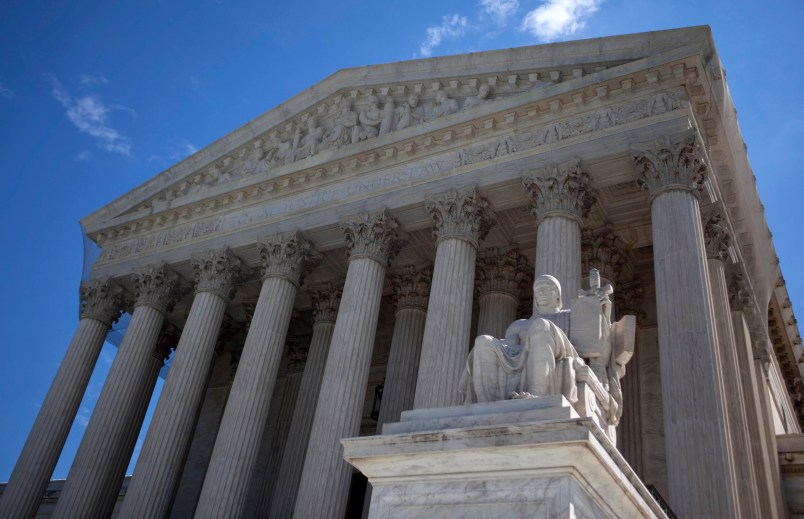When it comes to health care at the Supreme Court this year, all eyes are focused on the Obamacare tax credits case, King v. Burwell. But a case decided this week, Armstrong v. Exceptional Child Center, Inc., has raised significant concerns for the availability of quality health care for those who need it most.
In a 5-4 ruling, the Supreme Court turned against decades of legal precedent and ruled that Medicaid providers cannot use the Supremacy Clause of the U.S. Constitution to stop state provider payment policies that are inconsistent with the federal Medicaid Act’s requirement for adequate reimbursement rates. That may sound like a bunch of legalese, but the outcome has a real impact on the 68 million-plus people relying on Medicaid. If a state’s Medicaid payment rates are too low (and many providers complain these rates are below their cost of providing services), then provider participation in Medicaid—and the ability of enrollees to obtain care—is at risk.
Congress established Medicaid in 1965 as a cooperative program between states and the federal government. Medicaid is designed to ensure access to healthcare to low-income children, pregnant women, people who are aged, blind or have disabilities, and now, in roughly half the country, low-income adults. When a state participates in Medicaid, it receives federal money and in return, must comply with federal requirements. The Medicaid provision at issue in Armstrong requires states to pay Medicaid-participating health care providers enough so that beneficiaries have access to care and services to the same extent as privately-insured people who live in their area. This requirement is intended to avoid a two-track health care system and situations where individuals and families must drive long distances to find a Medicaid provider. For example, in one case an enrollee had to travel eight hours round trip and sleep in the doctor’s parking lot just to make sure they got an appointment. Medicaid’s framework of setting federal standards is designed to prevent this.
One of the reasons Medicaid has worked is that when states have violated the federal law, lawyers have been able to go to court on behalf of individuals who are being harmed by the state’s violation and protect them. In Armstrong, health care providers sued Idaho and argued the State’s reimbursement rates are so low they violate federal Medicaid law. As federal law reigns supreme, the providers argued that Idaho’s actions are illegal and must be stopped. Five justices disagreed and concluded that the providers couldn’t be in court at all.
Armstrong is about much more than providers arguing about their fares. It is about a central question to our justice system: Who gets to go to court? By limiting that “who” in this case, the Supreme Court has turned its back on more than 40 years of legal precedent. Every federal circuit court of appeals, and even the Supreme Court, have used Supremacy Clause analysis to determine whether state Medicaid laws are consistent with federal laws.
In Armstrong, the majority’s solution is to leave enforcement up to the federal Medicaid agency. However, the federal government is not a substitute for private enforcement in the courts. As stated by a number of federal agency heads in a brief submitted to the Supreme Court, the federal government has neither the resources to police how states implement Medicaid requirements, nor the necessary tool—the ability to immediately halt bad actions. Washington merely has a club. It can withdraw or withhold funding, at the expense of leaving both beneficiaries and the state in shambles.
When Congress enacted Medicaid nearly 50 years ago, the prevailing standard was for the courts to provide a remedy when there was a wrong. Congress understood and acted against that backdrop. By refusing to allow health providers through the court house doors, the Supreme Court has ignored longstanding precedent and Congressional understanding at the time it implemented Medicaid. Precedent and congressional intent—two things Justice Scalia says he holds dear.
Elizabeth G. Taylor is the executive director of the National Health Law Program (NHeLP) and Jane Perkins is the organization’s legal director. NHeLP is a nationally recognized legal non-profit dedicated to protecting and advancing the health rights of low income and underserved individuals.







So much for Stare Decisis . . .
So this is how Republicans intend to gut Medicare, too?
Meanwhile, all eyes and media were on Indiana.
So maybe the Feds will just have to use that club on Idaho. They will probably have to do so only once.
Yep, sucks to be sick and/or poor. But this is America, land of unlimited boot straps! If you’re not a 1%-er it’s your own damned fault. Just ask Ted Cruz. On second thought, you don’t need to ask him, he’ll be reminding you of it often for the next couple years.